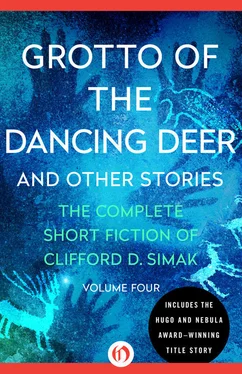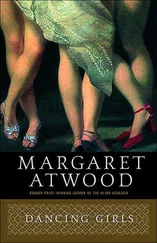He reached the side yard and stopped for a moment, listening, with the dog standing quietly at his side. A slight wind had come up and the trees were rustling. He lifted his head and stared at the delicate darkness of them, outlined against the lighter sky.
Beautiful things, he thought. It was a pity there were not more of them. Once this area had been named Oak Manor for the stately trees that grew here. There, just ahead of him, was the last of them—a rugged old patriarch with its massive crown blotting out the early stars.
He looked at it with awe and appreciation—and with apprehension, too. It was a menace. It was old and brittle and it should be taken down, for it leaned toward the fence and some day a windstorm might topple it across the wire. He should have mentioned it long ago to Mr. Crawford, but he knew the owner held this tree in a sentimental regard that matched his own. Perhaps it could be made safe by guywires to hold it against the wind, or at least to turn its fall away from the fence should it be broken or uprooted. Although it seemed a sacrilege to anchor it with guywires, an insult to an ancient monarch.
He moved on slowly, threading through the bomb traps, with the dog close at his heels, until he reached the patio and here he stopped beside the sun dial. He ran his hand across its rough stone surface and wondered why Mr. Crawford should set such a store by it. Perhaps because it was a link to the olden days before the Punks and raids. It was an old piece that had been brought from a monastery garden somewhere in France. That in itself, of course, would make it valuable. But perhaps Mr. Crawford saw in it another value, far beyond the fact that it was hundreds of years old and had come across the water.
Perhaps it had grown to symbolize for him the day now past when any man might have a sun dial in his garden, when he might have trees and grass without fighting for them, when he might take conscious pride in the unfenced and unmolested land that lay about his house.
Bit by bit, through the running years, those rights had been eroded.
II
First it had been the little things—the casual, thoughtless trampling of the shrubbery by the playing small fry, the killing of the evergreens by the rampaging packs of happy dogs that ran with the playing small fry. For each boy, the parents said, must have himself a dog.
The people in the first place had moved from the jam-packed cities to live in what they fondly called the country, so that they could keep a dog or two and where their children would have fresh air and sunlight and room in which to run.
But too often this country was, in reality, no more than another city, with its houses cheek by jowl—each set on acre or half-acre lots, but still existing cheek by jowl.
Of course, a place to run. The children had. But no more than a place to run. There was nothing more to do. Run was all they could do—up and down the streets, back and forth across the lawns, up and down the driveways, leaving havoc in their trail. And in time the toddlers grew up and in their teen-age years they still could only run. There was no place for them to go, nothing they might do. Their mothers foregathered every morning at the coffee klatches and their fathers sat each evening in the backyards drinking beer. The family car could not be used because gasoline cost money and the mortgages were heavy and the taxes terrible and the other costs were high.
So to find an outlet for their energies, to work off their unrealized resentments against having nothing they could do, these older fry started out, for pure excitement only, on adventures in vandalism. There was a cutting of the backyard clotheslines, a chopping into bits of watering hoses left out overnight, a breaking and ripping up of the patios, ringing of the doorbells, smashing of the windows, streaking of the siding with a cake of soap, splashing with red paint.
Resentments had been manufactured to justify this vandalism and now the resentments were given food to grow upon. Irate owners erected fences to keep out the children and the dogs, and this at once became an insult and a challenge.
And that first simple fence, Max told himself, had been the forerunner of the eight-foot barrier of electricity which formed the first line of defense in the Crawford stronghold. Likewise, those small-time soap-cake vandals, shrieking their delight at messing up a neighbor’s house, had been the ancestors of the Punks.
He left the patio and went down the stretch of backyard, past the goldfish-and-lily pond and the tinkling of the fountain, past the clump of weeping willows, and so out to the fence.
“Psst!” said a voice just across the fence.
“That you, Billy?”
“It’s me,” said Billy Warner.
“All right. Tell me what you have.”
“Tomorrow is Truce Day and we’ll be visiting …”
“I know all that,” said Max.
“They’re bringing in a time bomb.”
“They can’t do that,” said Max, disgusted. “The cops will frisk them at the gates. They would spot it on them.”
“It’ll be all broken down. Each one will have a piece. Stony Stafford hands out the parts tonight. He has a crew that has been practicing for weeks to put a bomb together fast—even in the dark, if need be.”
“Yeah,” said Max, “I guess they could do it that way. And once they get it put together?”
“The sun dial,” Billy said. “Underneath the sun dial.”
“Well, thanks,” said Max. “I am glad to know. It would break the boss’ heart should something happen to the sun dial.”
“I figure,” Billy said, “this might be worth a twenty.”
“Yes,” Max agreed. “Yes, I guess it would.”
“If they ever knew I told, they’d take me out and kill me.”
“They won’t ever know,” said Max. “I won’t ever tell them.”
He pulled his wallet from his pocket, turned on the flash and found a pair of tens.
He folded the bills together, lengthwise, twice. Then he shoved them through an opening in the fence.
“Careful, there,” he cautioned. “Do not touch the wire.”
Beyond the fence he could see the faint, white outline of the other’s face. And a moment later, the hand that reached out carefully and grabbed the corner of the folded bills.
Max did not let loose of the money immediately. They stood, each of them, with their grip upon the bills.
“Billy,” said Max, solemnly, “you would never kid me, would you? You would never sell me out. You would never feed me erroneous information.”
“You know me, Max,” said Billy. “I’ve played square with you. I’d never do a thing like that.”
Max let go of the money and let the other have it.
“I am glad to hear you say that, Billy. Keep on playing square. For the day you don’t, I’ll come out of here and hunt you down and cut your throat myself.”
But the informer did not answer. He was already moving off, out into the deeper darkness.
Max stood quietly, listening. The wind still blew in the leaves and the fountain kept on splashing, like gladsome silver bells.
“Hi, boy,” Max said softly, but there was no snuffling answer. The dog had left him, was prowling with the others up and down the yard.
Max turned about and went up the yard toward the front again, completing his circuit of the house. As he rounded the corner of the garage, a police car was slowing to a halt before the gates.
He started down the drive, moving ponderously and deliberately.
“That you, Charley?” he called softly.
“Yes, Max,” said Charley Pollard. “Is everything all right?”
“Right as rain,” said Max.
He approached the gates and saw the bulky loom of the officer on the other side.
“Just dropping by,” said Pollard. “The area is quiet tonight. We’ll be coming by one of these days to inspect the place. It looks to me you’re loaded.”
Читать дальше












